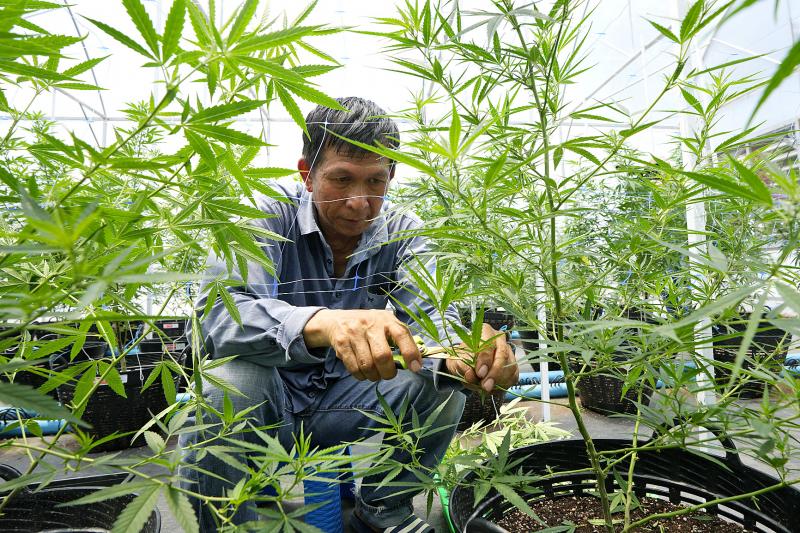Thailand has made it legal to cultivate and possess marijuana as of Thursday, a decision that makes Thailand the first Asian nation to decriminalize marijuana for medical and industrial use.
The public health minister’s plan to distribute 1 million marijuana seedlings, beginning yesterday, has added to the impression that Thailand is turning into a weed wonderland.
However, it is not following the examples of Uruguay and Canada, the only two countries so far that have legalized recreational marijuana nationally.

Photo: AP
So far, it appears there is no effort to police what people can grow and smoke at home, aside from registering to do so and declaring it is for medical purposes.
Some Thai advocates celebrated on Thursday by buying marijuana at a cafe that had previously been limited to selling products made from the parts of the plant that are not intoxicating. The dozen or so people who turned up early at the Highland Cafe were able to choose from a variety of buds with names such as Sugarcane, Bubblegum, Purple Afghani and UFO.
“I can say it out loud that I am a cannabis smoker. I don’t need to hide like in the past when it was branded as an illegal drug,” said 24-year-old Rittipong Bachkul, the day’s first customer.
“As far as the government is concerned, it’s their job to promote medical use only, but it is pretty clear that we have come very far and finally are legalizing its use,” said Rattapon Sanrak, the cafe’s co-owner and a legalization advocate. “The government understands that it’s more pros than cons,”
The country is known for its Thai Stick variety, which is named after the way its potent flowers are dried and tied into sticks, and is the origin of many strains now grown overseas.
Thailand’s government said that those who light up for fun in public could still be considered a nuisance, subject to a potential 3-month jail sentence and 25,000 baht (US$719) fine.
Marijuana extracts, such as oil, remain illegal if they contain more than 0.2 percent tetrahydrocannabinol, or THC, the chemical that makes cannabis users high.
Tourists should proceed cautiously until the rules become clearer after a new cannabis law is passed, said Sarana Sommano, a professor of plant and soil sciences at Chiang Mai University.
“There are still risks. The problem is that cannabis is no longer considered a narcotic, but there are no ministry regulations” governing its use, Sommano said.
“There is no mention of limits on use, drug-impaired driving laws. This could be a mistake by the government in trying to rush out its policy to please voters without really planning the details and explaining to the public what’s going on,” she said.
“We should know how to use cannabis,” said Thai Minister of Public Health Anutin Charnvirakul, a marijuana advocate. “If we have the right awareness, cannabis is like gold, something valuable, and should be promoted.”
People who have been imprisoned for breaking the old law are expected to be released.

Intel Corp chief executive officer Lip-Bu Tan (陳立武) is expected to meet with Taiwanese suppliers next month in conjunction with the opening of the Computex Taipei trade show, supply chain sources said on Monday. The visit, the first for Tan to Taiwan since assuming his new post last month, would be aimed at enhancing Intel’s ties with suppliers in Taiwan as he attempts to help turn around the struggling US chipmaker, the sources said. Tan is to hold a banquet to celebrate Intel’s 40-year presence in Taiwan before Computex opens on May 20 and invite dozens of Taiwanese suppliers to exchange views

Application-specific integrated circuit designer Faraday Technology Corp (智原) yesterday said that although revenue this quarter would decline 30 percent from last quarter, it retained its full-year forecast of revenue growth of 100 percent. The company attributed the quarterly drop to a slowdown in customers’ production of chips using Faraday’s advanced packaging technology. The company is still confident about its revenue growth this year, given its strong “design-win” — or the projects it won to help customers design their chips, Faraday president Steve Wang (王國雍) told an online earnings conference. “The design-win this year is better than we expected. We believe we will win

Chizuko Kimura has become the first female sushi chef in the world to win a Michelin star, fulfilling a promise she made to her dying husband to continue his legacy. The 54-year-old Japanese chef regained the Michelin star her late husband, Shunei Kimura, won three years ago for their Sushi Shunei restaurant in Paris. For Shunei Kimura, the star was a dream come true. However, the joy was short-lived. He died from cancer just three months later in June 2022. He was 65. The following year, the restaurant in the heart of Montmartre lost its star rating. Chizuko Kimura insisted that the new star is still down

While China’s leaders use their economic and political might to fight US President Donald Trump’s trade war “to the end,” its army of social media soldiers are embarking on a more humorous campaign online. Trump’s tariff blitz has seen Washington and Beijing impose eye-watering duties on imports from the other, fanning a standoff between the economic superpowers that has sparked global recession fears and sent markets into a tailspin. Trump says his policy is a response to years of being “ripped off” by other countries and aims to bring manufacturing to the US, forcing companies to employ US workers. However, China’s online warriors